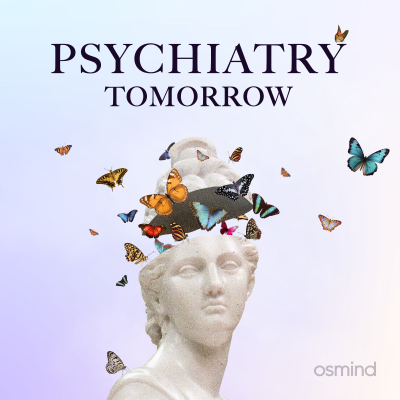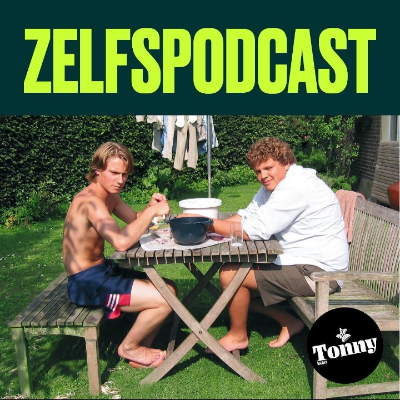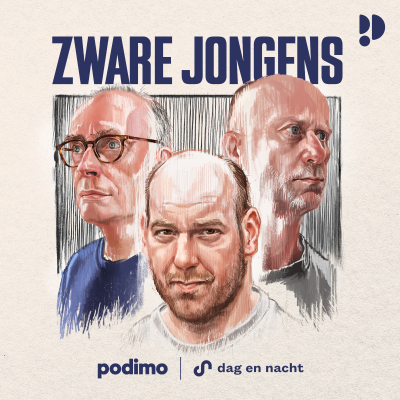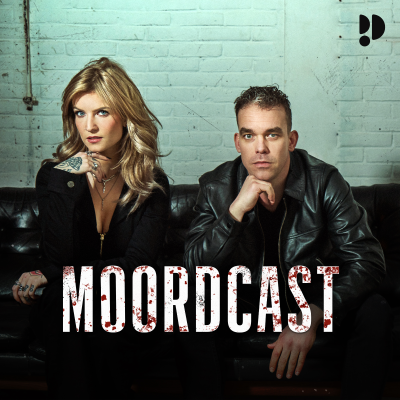
Psychiatry Tomorrow
Podcast door Osmind
Psychiatry is entering a new era. Join host Carlene MacMillan, M.D., Psychiatrist and Chief Medical Officer at Osmind, for Psychiatry Tomorrow, where we delve into captivating conversations with mental health leaders advancing the field. From groundbreaking research and technology, to the modern private practice and the policies shaping psychiatry’s future. Navigate the exciting realms of neuromodulation, rapid-acting antidepressants, metabolic psychiatry, psychedelic medicine, starting a private practice, and much more. Join us on this thrilling journey, and let’s transform mental health together.
Tijdelijke aanbieding
3 maanden voor € 0,99
Daarna € 9,99 / maandElk moment opzegbaar.
Alle afleveringen
26 afleveringenSUMMARY Dr. Nicholas Fabiano, a third-year psychiatry resident at the University of Ottawa with 70,000+ X followers, explains how exercise can match antidepressants for mild-to-moderate depression through muscle-released proteins called myokines that act like "miracle grow for the brain." He introduces the FIT framework (Frequency, Intensity, Type, Time) for systematically discussing exercise with patients, similar to prescribing medication. Creatine supplementation, typically used by athletes, shows promise for mental health when used alongside traditional treatments, but brain benefits may require higher doses (10g+) than the standard 5g used in fitness. Fabiano warns that excessive exercise can become a form of self-harm when used to transfer emotional pain, with red flags including 6+ hours daily and frequent injuries. His vision for psychiatry's future centers on removing the artificial divide between mental and physical health, enabling better collaboration across medical specialties. Key takeaways: • Exercise intensity matters more than type for antidepressant effects • Creatine costs ~$35 for 90 servings and has favorable risk-benefit ratio • Supervised exercise interventions outperform unsupervised due to adherence • Future psychiatry requires integrated mind-body treatment approaches TIMESTAMPS / SHOWNOTES [00:00:00] Introduction - Dr. Fabiano's background and training structure in Canada [00:04:30] Defining lifestyle psychiatry and the mind-body connection [00:06:00] Exercise for depression - research evidence and meta-analyses [00:09:00] Exercise study design challenges and placebo controls [00:11:30] Exercise intensity vs. type - what matters for antidepressant effects [00:15:00] The muscle-brain connection - myokines and BDNF explanation [00:20:00] Creatine for mental health - from gym supplement to brain fuel [00:26:00] Clinical implementation - the FIT framework for prescribing exercise [00:33:00] Exercise as self-harm - warning signs and red flags [00:40:00] Balancing productivity with self-care during medical training [00:42:00] Future of psychiatry - removing mental-physical health divide Brought to you by: Osmind.org, the #1 All-in-one Billing Solution + EHR for the modern private psychiatry practice
After a young patient died by suicide, many psychiatrists might retreat to safer cases—Dr. Matt Bernstein took a different path, choosing to treat our field's highest-risk patients in their communities rather than behind hospital walls. Drawing from his experience at McLean Hospital's acute unit and now at Ellenhorn's community-based program, he shares practical insights on balancing clinical risk with recovery potential. Through the groundbreaking Accord Metabolic Psychiatry Program, Bernstein demonstrates how integrating metabolic approaches with psychosocial rehabilitation can reduce symptoms and medication needs. His team's comprehensive approach combines measurement-based care, metabolic interventions, and meaningful social engagement to help patients rebuild their lives. Perhaps most importantly, Bernstein challenges our field's approach to risk, arguing that acknowledging psychiatry's mortality rate—while maintaining hope for recovery—opens new possibilities for treatment. His work offers a compelling model for moving beyond crisis management to create sustainable paths for recovery, even in our most complex cases. Episode Show Notes and Timestamps: [00:00:00] - Introduction: After a young patient's death by suicide, Dr. Bernstein chose to focus on high-risk psychiatric care in community settings. [00:01:00] - Host Dr. Will Sauvé introduces his background in military psychiatry and interventional approaches. [00:02:00] - Overview of Dr. Bernstein's career trajectory from McLean Hospital to pioneering community-based care. [00:03:00] - Early career at McLean Hospital - 8.5 years on Schizophrenia and Bipolar Inpatient Unit - Experience teaching residents - Transition to longitudinal care focus [00:05:00] - The PACT Model and Ellenhorn's Evolution - Origins in 1970s Wisconsin - Design as "hospital without walls" - Transition from public to private sector implementation [00:08:00] - Ellenhorn's Comprehensive Approach - Holistic treatment model - Integration of psychosocial rehabilitation - Focus on real-world functioning [00:11:00] - Discussion of Risk Management in Psychiatry - Comparison with other medical specialties - Role of clinical judgment - Impact on treatment decisions [00:13:00] - Development of Metabolic Psychiatry Program - Introduction to ketogenic approaches - Implementation of fasting protocols - Creation of Accord program [00:16:00] - Measurement-Based Care Strategies - Standard clinical measures - Functional outcome assessments - Digital phenotyping implementation [00:20:00] - Family Engagement and Risk Assessment - Shared decision-making approach - Balance of clinical liability and treatment access - Case example of successful risk management [00:28:00] - Future Directions - Integration of innovative treatments - Expansion of metabolic approaches - Vision for community-based care Key Quotes: - "What we find is that when we can get people connected psychosocially out there in real jobs or school or relationships, those experiences can reduce symptoms and take the place of medications." - "These are illnesses that have a mortality rate... sometimes someone dies and everyone did everything exactly right." - "It's a great time to be working in psychiatry because of these options that we didn't have even ten years ago." Resources Mentioned: - Program of Assertive Community Treatment (PACT) - Ellenhorn Community Treatment Program - Accord Metabolic Psychiatry Program Brought to you by: Osmind.org, the #1 All-in-one Billing Solution + EHR for the modern private psychiatry practice
Dr. Husseini K. Manji takes us behind the scenes of esketamine's development, from basic neuroscience research to FDA approval. Learn about the science of targeting NMDA receptors, the rigorous clinical trial process, and the potential of esketamine as a first-line treatment for depression. Dr. Manji discusses the challenges of bringing a novel psychiatric drug to market, including regulatory hurdles and insurance coverage issues. He also explores the broader implications of esketamine's success for mental health treatment, including the fight for parity and the future of psychedelic medicine development. This episode offers invaluable insights for clinicians, researchers, and anyone interested in the future of psychiatry and drug innovation. Brought to you by: Osmind.org, the #1 All-in-one Billing Solution + EHR for the modern private psychiatry practice
Charles Miller, CRNA, founder of Scenic City Neurotherapy, takes us through his journey of starting a ketamine infusion therapy clinic from scratch. From cashing out his 401k to navigating complex licensing requirements, Charles shares the ups and downs of building a successful practice. He discusses the importance of patient education, the challenges of insurance reimbursement, and the role of technology in streamlining operations. Charles also offers insights on expanding services, managing supply chains, and building a strong team. This episode is packed with practical advice for clinicians considering opening their own breakthrough treatment clinic or expanding their existing services. Timestamps with show notes: [00:00:00] Introduction to Charles Miller and Scenic City Neurotherapy [00:01:00] Charles' background in anesthesiology and interest in ketamine therapy [00:02:00] The decision to start a ketamine clinic and initial research [00:05:00] Starting small: Initial funding and facility setup [00:08:00] Navigating business challenges: Licensing and financial management [00:11:00] Collaborating with psychiatrists and expanding services to include TMS [00:15:00] The importance of patient education in ketamine therapy [00:18:00] Securing VA contracts and navigating insurance reimbursement [00:22:00] Using Osmind platform for practice management [00:24:00] Building a strong team and hiring process [00:28:00] Community education and advertising strategies [00:31:00] Measuring success and patient outcomes [00:35:00] Managing supply chain challenges and diversifying suppliers [00:38:00] Proactive approach to regulatory compliance [00:41:00] Advice for aspiring clinic owners [00:45:00] Concluding thoughts on the rewards of running a breakthrough treatment clinic Brought to you by: Osmind.org, the #1 All-in-one Billing Solution + EHR for the modern private psychiatry practice
In this episode of Psychiatry Tomorrow, Dr. Carlene MacMillan hosts a panel of experts to discuss the FDA's pending decision on MDMA-assisted therapy for PTSD. The conversation explores the current landscape of clinical enthusiasm and regulatory caution, key challenges facing approval, and potential regulatory requirements. Panelists Dr. Owen Muir, Dr. Boris Heifets, and Andrew Penn share their insights on functional unblinding in clinical trials, safety monitoring, and provider qualifications. The episode concludes with a look at the future of psychedelic medicine and the potential impact of the FDA's decision on mental health treatment. Brought to you by: Osmind.org, the #1 All-in-one Billing Solution + EHR for the modern private psychiatry practice
Tijdelijke aanbieding
3 maanden voor € 0,99
Daarna € 9,99 / maandElk moment opzegbaar.
Exclusieve podcasts
Advertentievrij
Gratis podcasts
Luisterboeken
20 uur / maand



















